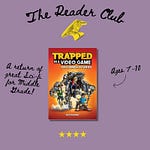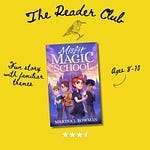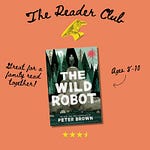Intro to Book
Hello Readers,
Today’s book review is going to be a little more interesting than normal. I’m going to start by letting you know that this book is for the young adult crowd. So, if you’ve been listening with younger readers, this episode is going to have older themes and I want you to be aware. It is a fantasy book with what I could only imagine as the young adult version of Thumbelina meets Game of Thrones. I’m only slightly aware of that latter series as what I’ve heard about it makes me wary of reading it. But the general concept of vying powers garnering influence for a chance at the throne, or in this case, the crown, is what this book is all about.
The Cruel Prince by Holly Black is a popular young adult fantasy book and is the first in a growing series. At least, I think it is still going. It is fantasy and I feel the need to define what types of fantasy there are here. There is high fantasy; a world completely different from our own. The opposite of that is low fantasy; where magic takes place in our world but we are unaware of it. Finally, there is magic realism is another term to describe fantasy and that is where magic is a natural occurrence all people are usually aware of in our everyday world. Like an alternate reality sort of thing. But this is low fantasy but since most of the book takes place in a magical realm, it feels like high fantasy.
Summary
First off, let me say that it will be hard to summarize this story into digestible bites without giving some major spoilers. It starts off with a bang, almost enough to make me put the book down and not review it at all but I decided to push through. I will say, I am glad I did because I did enjoy the story but it was unsettling nonetheless.
This is a violent story about a family who is part human part fae or fair folk. They live in the fae world but are obviously not from it and do not fit in. The fae are….odd…to say the least. They are pretty much able to get away with anything they want, while humans are often let’s say over enamored with them doing their bidding. This follows darker fairy tale storylines where fairies are tricksy, and well, cruel, especially to humans. All the while, this family is close to the royal family of the fair folk and several members are hated all the more for their position. These members must protect themselves from the enchanting presence of the fairies in many different ways but as the story progresses it gets more difficult to do so. It focuses on one member in particular and her many struggles to live in the fairy world.
Okay…I think I’ve summarized it vaguely enough, hopefully leaving it enticing enough to read without disclosing too many things. Again, it starts off with a bang. I read this in two or three nights because I kind of got hooked.
Characters
Okay, so this is an older book. The characters are far more diverse and complex than in some of the other books I’ve read. I’ll start with the family, then maybe some of the other characters because there is much to know.
The main character is a girl named Jude. She is fully human. We first meet her when she is very young, seven years old, but the story takes place when she is seventeen. She is headstrong and quite capable. She is determined to get into positions of power because she feels powerless in the land of fairies. She loves the Fairyland and is determined to make her way in the world
Taryn is Jude’s twin sister. She is the exact opposite of Jude in every way possible except that she also loves Fairyland.
Vivienne also called Vivi, is their older sister. She is half human, half fairy. She cannot be controlled like a human but can pass as either in the fairyland or as a human in our world. She hates the world of fairies and everything about it.
General Madoc is Vivienne’s biological father and Jude and Taryn’s adoptive father. He is both harsh and loving, tender and cruel. It is a tempestuous relationship they all have with him. But there is a kind of endearing love Jude has for him.
Oriana is their stepmother. She’s kind of frantic about everything all the time.
Oak is Madoc and Oriana’s son. He’s six and he acts like a six-year-old boy. He is described as sickly, but we do not see much of that in the book.
Okay, for non-family members, there are a few important ones to keep track of.
The King, though he is hardly featured is important. He really only makes an appearance in one or two scenes. But several of his children are important.
Prince Dain is the third oldest child and is rumored to be the heir to the crown.
Prince Balekin is the oldest child and has very dark rumors about him.
Prince Cardan is the youngest child and has an equally bad reputation as Balekin. He goes to school with Jude and Taryn and is the bane of Jude’s existence.
There are other royal members, the sisters, but they are not often mentioned in the story.
Cardan also has some friends who are equally as cruel as he is. Oh, he is the Cruel Prince. It eludes to this on the back of the book so I don’t really feel I’m spoiling anything here. His friends Nicasia, Valerian, and Locke are mostly pretty horrible…though one of them seems to sort of come around. They all cause trouble for Jude who often defies them. Again, this is on the back of the book. Not spoiling anything.
Analysis
Writing the summary I thought this would be difficult without spoilers, but doing the analysis is a whole new ballgame of difficulty. I am going to let you know about a couple of scenes here which I feel I must fill you in on in some detail. And if you’ve listened so far, I want to let you know, that I’m not certain I would recommend this book to someone. There are shows and books I enjoy and let people know I enjoyed them, but I can’t say I’d recommend them. Sometimes this is because there are inappropriate jokes or language in them and so pervasive it is somewhat uncomfortable. Sometimes this is because it is violent and the violence of the book or movie is too much. Sometimes this is because it is too sensualized to the point of being uncomfortable. I’m not even talking about nudity or sexual acts, that’s off the table. Just too much. This book is kind of like that so I’m going to let you know exactly what they are. But let me say, none of it is praised. It just is a part of the world they live in, and the reality of it sucks for the characters in the book.
Major Themes:
The major theme of this book is power and how to obtain it to stop feeling powerless. I’m not sure if Black is commenting on the negativity of this, but throughout the book, the steps to get power have some serious side effects. This is a young adult book so another major theme is romantic interests. The romantic exploits of the characters are fickle at best.
Writing Style:
This book is for older readers, both in content and writing style. It is not quite a diary, but it is a story told by Jude, not just from her perspective. It is mostly written in the first-person perspective though at some points Jude keeps us in the dark about some things she is thinking. This writing style, content, and context all put this book at sixteen years old for a reader. I have seen some reviews of it much younger but because of everything I’m going to tell you about it is for a much older audience in my opinion. Again, I wouldn’t say I recommend it for a sixteen-year-old, but I wouldn’t let someone younger than sixteen read it.
Plot:
The plot is very intriguing. It keeps the reader engaged and hooked to the story. Holly Black is a great writer, captivating the imagination of her readers. But it is a weaving, twisting tale. One that is hard to follow for younger readers. The more mature content all plays a significant role in the plot. There are some books you can skip past certain mature themes and it would have no impact on the book. They are just cheap thrills thrown in and in all my years of reading, I can’t discern why. Not this book. Black uses these things to tell the story.
Gospel Connections:
This is not your cut-and-dry Gospel conversation for this story. There may be one redeemable quality in this book. The protection of someone from the world of the fairies so they won’t be influenced by them. Spurred by Jude herself. That’s about it. But it doesn’t make the story bad and I am not going to judge the story based on the one book. It could be that within the larger story of the series, more redeemable things occur. Who knows? I haven’t read the rest of the series yet. And I do mean yet. So, let me mention briefly what may be a second redeemable fact, it doesn’t speak positively of any of the negative things happening in Fairyland.
I’m not trying to justify these things in the book, I’m just here to explain what they are. I will say, that the Bible often shows us many terrible situations and things about our human, sinful nature, not shying away from their negative impacts. This book resonates with this sentiment. It is not shying away from it, and it makes significant strides to show the negative results of these stories. So, here are the negative things, and they are a bit of spoilers.
Brutal, cold-blooded murders happen in the book. I wouldn’t say frequently, but often enough that the characters are desensitized to them. There are at least five scenes that show this kind of murder. And there is one stabbing and one killing that is in self-defense from rather disturbing attacks. There is a cold-blooded assassination that happens as well. Besides all of this, the book is kind of just violent. Almost uncomfortably so.
There is a same-sex attracted character. There is nothing sexual written about the relationship but it can be assumed from context that it is happening. This may be the one point of contention with the Bible that doesn’t speak of these relationships in the same way. The outlook is rather positive in the story but the Bible speaks of romantic and sexual relationships in one way positively, marriage between one man and one woman. Nothing else is positively spoken about though they are often written about in the Bible. This relationship is kept hidden from many people because of a singularly odd conservative nature of some characters, though Jude is aware of it.
Then there are the fairies. There is not much that is redeemable about them. Most of them are violent, cruel, and perverse. They are the darker nature of humanity. All of it. They took and embodied the darker human nature. This world isn’t quite like what I would imagine Sodom and Gomorrah to have been, but it isn’t far either. First of all, fairies are racist in this story. Not against differing colors of skin, but they hate the human race and they make sure humans know it. They enamor or what the book calls “glamour” humans. They basically drug them. Then they make them do whatever they want. Slavery, eating weird or poisonous things or sexually exploiting them. There is one scene where a glamoured human is made to take her clothes off. She is wearing underwear and one fairy stands up against it before things get out too out of hand. Again, almost closed the book here but it came just to the edge of uncomfortable.
Then the fairies party like it’s 1999. They drink, take substances like drugs, and are described often enough as waking up in twisted and sprawled-out limbs in places all over houses and other locations. I don’t think I need to paint the picture of what happened. It again is seen as a negative to fairyness. It isn’t viewed positively by Jude, it is just the world she finds herself in. Which I think is the saving grace of the book.
Besides all of this, there is a bit of cursing in the book. Not a ton, but it is there. Some of my least favorite words as the cursing vernacular goes too.
In many ways, Jude wants to be a part of the fairy world. She wants to earn her place there. But she is torn because she sees the negativity. She also wants to make it better. I believe this may be unintentional, but Black may have just written a book about the conquering nature of sin. If we’re all honest, we both hate and love our sins. If we didn’t it would be easy to stop sinning once and for all. But it isn’t that easy this side of heaven. This is the opposite book of Pilgrim’s Progress showing us the darker side of humanity and the destruction it can bring to our lives. Again, the only redeeming point being the fact that to save someone from the darkness, they have to be taken out of it.
Social Impact:
Socially, this book has many political implications. There is obviously the King’s Court and the many positions of power within it. This can be seen in every political power in the world. And while they aren’t necessarily killing each other for positions of power, the vying over them has the same destructive force.
Then there’s the romance. Oh man, is it bad. Nothing sexual, just so broken. It is heartbreaking to read, but I am sure these types of relationships do happen. In one instance, a character is playing games between two other romantic interests purposefully creating chaos between them because this character likes the chaos. It is very saddening. And again, we see the cracks and darkness of the situation as it stands.
There is so much about this book, though in a fairy world, that reflects the dark side of human nature. Drugs, alcoholism, the elevation of sex, and so on, make it so the book could be seen as a social commentary on the destructive ways these things are used and done. I’m not sure that was the intended storyline, but it can be argued as such.
Final Thoughts
Overall, I enjoyed the book. I feel as if it were a digestible Game of Thrones for someone like me who was interested in those books but could never really read them. But also, I feel I can’t recommend it for the same reason. It was just too close to the edge for me to do so. I do believe an older reader could handle the less-than-desirable situations that arise in the book. That is, if they could look at it through the lens of the Bible. Otherwise, the world that Jude longs to be a part of, the darkness that draws her in, might just draw the reader in as well. It is an exciting, daring world, and unless we’re able to see that darkness for what it is, it can pull us. So, discernment is necessary for this novel. I leave that discernment up to you.
Until next time, have a good read.













Share this post